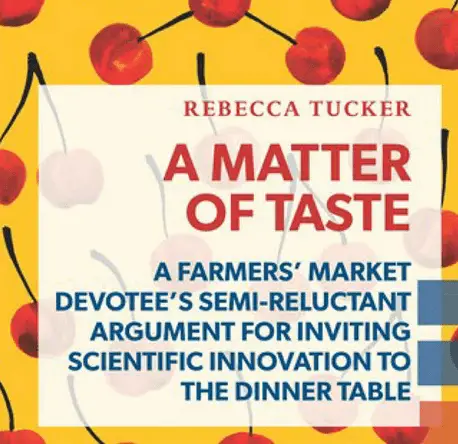[amazon_link asins=’1552453677′ template=’AiPTProductAd’ store=’aiptcomics-20′ marketplace=’US’ link_id=’7ddd1f49-975b-4314-aa9d-da5d715d225a’]
The foodie ecosystem is dominated by polarizing movies, most of which should be labeled to indicate they’re beyond their sell-by date. Typically containing stale feelings and claims of folks like Michael Pollan and Vandana Shiva (who was called by one scientist the “Nicholas Cage” of food films), lamenting the evils of modern farming and food production. When a slim volume by Rebecca Tucker came my way, titled A Matter of Taste: A Farmers’ Market Devotee’s Semi-Reluctant Argument for Inviting Scientific Innovation to the Dinner Table, I was pleasantly surprised to find someone had seen through the fog of misinformation provided by these films.
Tucker is a writer with interests in a range of cultural issues. Without a particular science background, her approach to the topic is like that of anyone else who faces the food choices at the grocery store and farmers’ market. A Matter of Taste isn’t bogged down with tech details, but is more of an overview of the central drama of good vs. evil food options, though Tucker does provide appetizers of the types of technology that have been (undeservedly?) demonized.
Taste is a quick read. Coach House Books, the publisher, describes the format as an “Exploded View;” longer than a magazine article but shorter than a book. In this case, it’s a feature and not a bug. Tucker cuts right to the core of the actual issues, without sepia-toned photos of rolling farm hills and accompanying folk guitar music. She rapidly frames the discussion of food in the context of the battle of the good-and-pure small, slow, organic farming methods vs. the evil, industrialized production systems that most current films and aligned product marketing companies like Chipotle have promoted.
“The messaging in the spot was clear,” Tucker writes. “It wasn’t so much ‘Eat Chipotle’ as it was ‘Feel like sh*t for eating anything that isn’t as ethical as Chipotle …'” (Yes, the that’s the same Chipotle that sickened a whole lot of people with their “ethical” foods.)
Tucker correctly identifies that the gist of food drama is to virtue-wash the product choices with what Naomi Klein calls “liberal platitudes” that make your purchases “an ally in the struggle.” She explains that the discussion has little to do with the actual realities of feeding urbanizing populations. In fact, this haze becomes a barrier to real understanding and evaluation of potential solutions to the challenges of feeding the future.
Tucker nails the problem that outright rejection of food and farming technology as “bad” and “evil” harms our progress toward sustainable solutions, which can include abundant and affordable food and appropriate wages for farm workers, in a world where urban consumers are the reality. “City dwellers are not farmers,” she writes, “and community garden plots and backyards are both luxuries as urban density intensifies.”
Innovations which loom large in food and farming are sufficiently described, but maybe not enough to satisfy those who want to delve into the topic. Precision farming — enabling farmers to be “growing more on less” with technology — is explored. GMOs (or, as we call them now, bioengineered crops) and gene editing are identified as being unfairly fearmongered, and lab-based meat products are considered as part of the future mix of options. “Big data” farming in small-footprint containers are touched upon as future disrupters of the status quo.
Although there are a few technical errors and misstatements, such as organic means “without pesticides,” generally the case Tucker makes is solid. She highlights one film that presented the other side of food technology in a positive light, Food Evolution, but trips on the technology involved (it didn’t cover gene editing at all, but existing GMO technology).
Tucker makes a genuine effort to disentangle the quasi-religious issues around our feelings about food and the realities of food production. She explores existing solutions and future directions that can contribute to future flourishing of both eaters and the environment. A Matter of Taste: A Farmers’ Market Devotee’s Semi-Reluctant Argument for Inviting Scientific Innovation to the Dinner Table asks us to look clearly at the facts and choices that will provide us with a sustainable and realistic future.
“As the planet approaches a population of nine billion,” Tucker writes, “those fishes and loaves aren’t going to divide themselves.”
Mary Mangan is a biologist specializing in bioinformatics and genomics.
Join the AIPT Patreon
Want to take our relationship to the next level? Become a patron today to gain access to exclusive perks, such as:
- ❌ Remove all ads on the website
- 💬 Join our Discord community, where we chat about the latest news and releases from everything we cover on AIPT
- 📗 Access to our monthly book club
- 📦 Get a physical trade paperback shipped to you every month
- 💥 And more!













